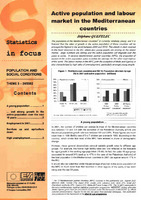Statistics in Focus: Population and social conditions. Active population and labour market in the Mediterranean countries.
| dc.contributor.author | EU Commission |
| dc.date.accessioned | 2020-11-18T15:07:22Z |
| dc.date.available | 2020-11-18T15:07:22Z |
| dc.date.issued | 2002-10-17 |
| dc.identifier.issn | 10244352 |
| dc.identifier.uri | https://ketlib.lib.unipi.gr/xmlui/handle/ket/3079 |
| dc.description | http://aei.pitt.edu/id/eprint/85327 |
| dc.description.abstract | The population of the Mediterranean countries1 is currently relatively young, and it is forecast that the rates of growth in the active population of these countries will be amongst the highest in the world between 2000 and 2010. This stands in stark contrast to the trend observed in the EU, where less young people are arriving on the labour market, large numbers are retiring and the active population will stagnate over the years to come. In several Mediterranean partner countries (MPC), the proportion of women in the active population active is below the average for the other main regions of the world. The labour market in the MPC (with the exception of Malta and Cyprus) is also characterised by high rates of unemployment, particularly amongst young people. |
| dc.format.extent | 4p. |
| dc.language.iso | en |
| dc.publisher | Eurostat |
| dc.subject | Social policy |
| dc.subject | Social Europe |
| dc.subject | Demographics |
| dc.title | Statistics in Focus: Population and social conditions. Active population and labour market in the Mediterranean countries. |
| dc.type | Working Document |
| dc.publisher.place | Luxembourg |

